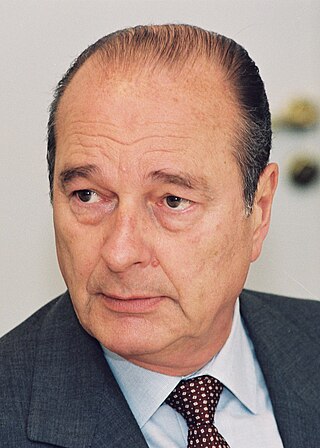
Jacques René Chirac was a French politician who served as President of France from 1995 to 2007. Chirac was previously Prime Minister of France from 1974 to 1976 and from 1986 to 1988, as well as Mayor of Paris from 1977 to 1995.

The Fifth Republic is France's current republican system of government. It was established on 4 October 1958 by Charles de Gaulle under the Constitution of the Fifth Republic.

Aimé Fernand David Césaire was a Francophone Martinican poet, author, and politician. He was "one of the founders of the Négritude movement in Francophone literature" and coined the word négritude in French. He founded the Parti progressiste martiniquais in 1958, and served in the French National Assembly from 1945 to 1993 and as President of the Regional Council of Martinique from 1983 to 1988.

Nicolas Paul Stéphane Sarközy de Nagy-Bocsa is a French politician who served as the President of France from 2007 to 2012.
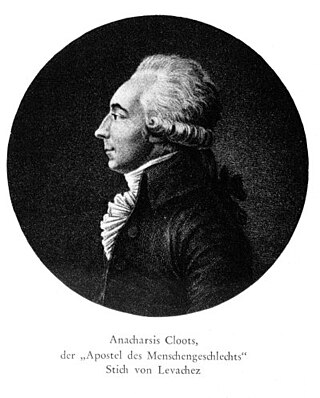
Jean-Baptiste du Val-de-Grâce, baron de Cloots, better known as Anacharsis Cloots, was a Prussian nobleman who was a significant figure in the French Revolution. Perhaps the first to advocate a world parliament, long before Albert Camus and Albert Einstein, he was a world federalist and an internationalist anarchist. He was nicknamed "orator of mankind", "citizen of humanity" and "a personal enemy of God".
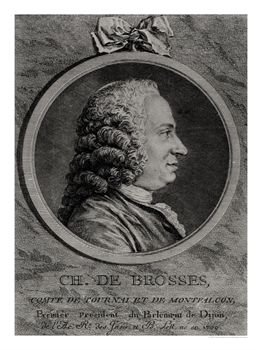
Charles de Brosses, comte de Tournay, baron de Montfalcon, seigneur de Vezins et de Prevessin, was a French scholar of the 18th century.
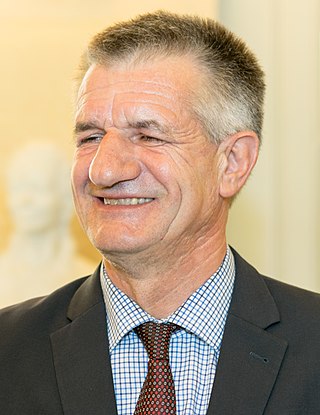
Jean Lassalle is a French politician who represented the 4th constituency of the Pyrénées-Atlantiques department in the National Assembly from 2002 to 2022. A former member of the Democratic Movement (MoDem), he was a candidate in the 2017 presidential election, in which he received 435,301 votes (1.21%). Lassalle ran under the banner of Résistons! (RES), a party he founded and has led since he left the MoDem in 2016. In the 2022 presidential election he received 1.3 million votes constituting over 3% of those cast.
French presidential debates, broadcast on TV, traditionally occurred only between the two rounds of the presidential elections.
In 2017, for the first time, a presidential debate took place prior to the first round.

Yves Roucaute is a French philosopher, Phd, Phd (philosophy), writer, professeur agrégé in philosophy, professeur agrégé in political science, teaching at Paris X University Nanterre, Previous President of the scientific Council of the "Institut National des Hautes Etudes de Securité et de Justice", director of the review "Cahiers de la Sécurité", counsellor of the "réformateurs" group at the French National Assembly. He has held a number of positions in cabinet ministers of right-wing governments, and is a close friend of Alain Madelin, Jean-Pierre Raffarin, and Nicolas Sarkozy. He is also a journalist and columnist He was editing director of some newspapers and he is the owner of newspaper in the south of France and minority stockholder of some others. He is the majority stockholder of "Contemporary Bookstore" SAS.

Denis Jeambar is a French journalist.

Amable de Bourzeis was a French churchman, writer, hellenist, and Academician.

Denis Tillinac was a French writer and journalist.

Guillaume-Charles Faipoult was a French aristocrat, soldier and politician who was Minister of Finance during the French Revolution. He then represented France in Italy, where he organized the newly formed republics. During the First French Empire he was prefect of the Scheldt department, and then Minister of Finance in Spain under Joseph Bonaparte. Faipoult was prefect of Saône-et-Loire during the Hundred Days.

Emmanuel Jean-Michel Frédéric Macron is a French politician who has served as President of France since 2017. Macron is ex officio one of the two Co-Princes of Andorra. He previously served as Minister of Economics, Industry and Digital Affairs under President François Hollande from 2014 to 2016, and as Deputy Secretary-General to the President from 2012 to 2014. He is a member of Renaissance.

The Republicans is a liberal-conservative political party in France, largely inspired by the Gaullist tradition. The party was formed on 30 May 2015 as the re-incorporation of the Union for a Popular Movement (UMP), which had been established in 2002 under the leadership of then President of France Jacques Chirac.

Renaissance (RE) is a liberal and centrist political party in France. The party was originally known as En Marche ! and later La République En Marche ! before adopting its current name in September 2022.

Dominique Maingueneau is a French linguist, emeritus Professor at Sorbonne University (Paris). His research focuses on discourse analysis. It associates a pragmatic outlook on discourse with linguistic «enunciation» theories and some aspects of Michel Foucault's line of thought.
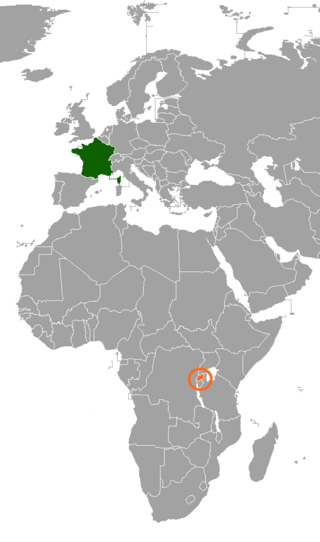
France–Rwanda relations are the international relations between France and Rwanda.
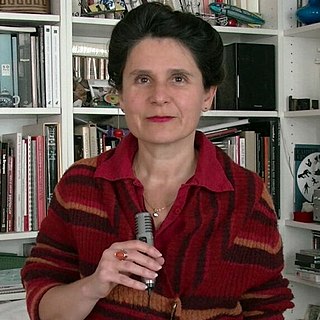
Sophie Wahnich is a French historian. She is director of research at the French National Centre for Scientific Research (CNRS) and a specialist in the French Revolution.


















